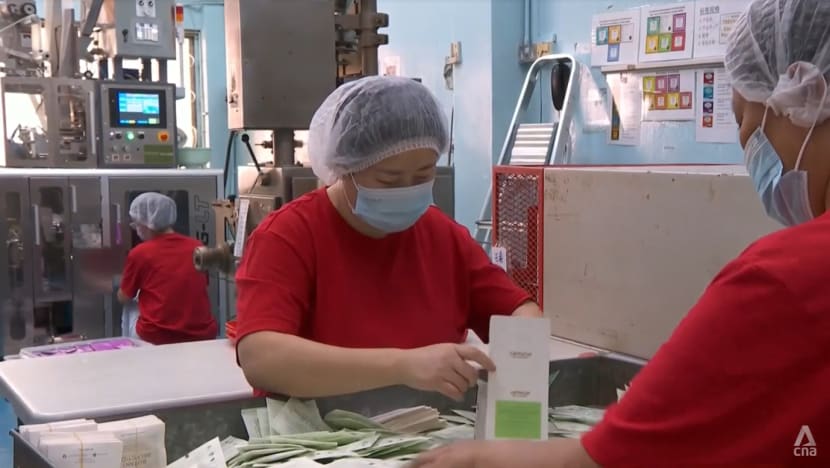Lack of manpower, supply chain disruptions: Manufacturing body calls for innovation to stay competitive
The Israel-Hamas war and the Red Sea crisis have caused import costs to rise by about 20 per cent, in turn leading to higher production costs for manufacturers.

Workers assembling boxes of Gryphon Tea, a Singapore gourmet tea brand.

This audio is generated by an AI tool.
SINGAPORE: Amid a manpower crunch and global crises that have disrupted supply chains, the Singapore Manufacturing Federation (SMF) has called on the sector to innovate or risk falling short of its 10-year growth target.
The decade-long plan to grow Singapore’s manufacturing sector by 50 per cent, as well as maintain its share of about 20 per cent of gross domestic product (GDP), was announced in January 2021.
At the time, the sector – Singapore’s largest industry – contributed about 21 per cent, or around S$106 billion (US$78.7 billion), of the total GDP. It hired 450,000 workers, or around 12 per cent of the workforce.
The sector has since grown by 17 per cent to about S$125 billion, or 18.6 per cent of the total GDP, in 2023.
However, firms told CNA that despite their best efforts to keep up with the latest trends and technology, external factors and a lack of manpower have made it tougher for them to stay competitive globally.
The Israel-Hamas war as well as the Red Sea crisis, which have been going on for six months, have caused import costs to rise by about 20 per cent. This has in turn led to higher production costs.
DELAY IN SHIPMENT
Homegrown gourmet tea brand Gryphon Tea pumped in S$250,000 to upgrade its packaging process and cater to an eco-friendlier population.
It now uses recyclable paper and plastics to make its tea bags, which can biodegrade in a shorter period of time compared to conventional plastics. It also uses compostable tea bags, which are plant-based and more environmentally friendly.
The company also installed solar panels to use more renewable energy and save costs in the long run. It has invested in automation, including robotics, in its production line, saving an average of 30 per cent in manpower costs that it can plough back into retraining workers.
However, the brand’s founder and executive director, Mr Lim Tian Wee, said a typical shipment coming from Europe now takes two months – up from the typical one month.
“I think with the Red Sea crisis and what’s happening in the Middle East, Singapore companies are having to deal with a much more complex supply chain,” he added.
“(Shipment delay) is a big problem for companies like us who are buying raw materials that are plant-based, so we are trying to solve this problem as best as we can. But we understand that this situation may last much longer than we would like it to.”
Mr Lim estimated that the company’s supply chain costs will increase by about 15 to 20 per cent.
“Overall, it’s not a great time … for food manufacturers, but we will do our best in terms of managing the whole issue,” he said.
“FULL ARRAY” OF GOVT SUPPORT
SMF president Lennon Tan said the challenge of rising costs is not new or unique to Singapore. But in Singapore’s context, there is a “full array” of government support to help manufacturing firms.
Manufacturers can also look at diversifying their supply chain and digitising processes, so they are less dependent on human labour and just one source, said Mr Tan.
He noted that the sector has always faced a lack of skilled labour, with many engineers choosing to go to other industries like IT and finance.
“We need to also let engineers have more opportunity to be a little bit more on your entrepreneur side, so they can also have that vision to have innovation to create products of their own. I think this will help the overall manufacturing sector,” he said.
New schemes to pair up multinational corporations (MNCs) with local firms could help to ease some of these pressures, Mr Tan noted.
Bigger companies can parachute their talent in and train Singaporeans, for instance, or invest in research and development to drive the manufacturing sector forward.
"The MNCs come in bringing billions of dollars of investment, bringing in the technology, bringing jobs, bringing know-how. I think the impact for the manufacturing sector is larger compared to a SME trying to expand, or grow organically into the region and so on,” Mr Tan said.
The association has been pushing its members to look overseas due to the small size of Singapore’s market, he added.
“Scary it might be, but I think it’s necessary to go out there, establish yourself and do business there as a manufacturer contributing towards that country and that market.”


















